Introduction
Welcoming a macaw into your home means committing to decades of specialized macaw health care. These magnificent parrots—with their vibrant plumage, impressive intelligence, and charismatic personalities—require attentive owners who understand the nuances of proper macaw health care practices. Whether you’re a new macaw parent or a seasoned avian enthusiast looking to enhance your knowledge, mastering essential macaw health tips can significantly impact your feathered friend’s quality of life and longevity.
Macaws are among the largest parrots in the world, with some species living 50-70 years with proper care. This remarkable lifespan means that understanding how to keep your macaw healthy isn’t just about addressing immediate concerns—it’s about establishing lifelong wellness practices. From nutrition to environmental enrichment, preventative care to recognizing early warning signs of illness, comprehensive macaw health care encompasses numerous critical aspects that every responsible owner must know.
In this detailed guide, we’ll explore five essential areas of macaw health care that form the foundation of responsible ownership. We’ll discuss proper nutrition, preventative health measures, psychological well-being, proper grooming, and emergency preparation—all vital components in ensuring your colorful companion thrives for decades to come.
1. Optimal Nutrition: The Foundation of Macaw Health Care
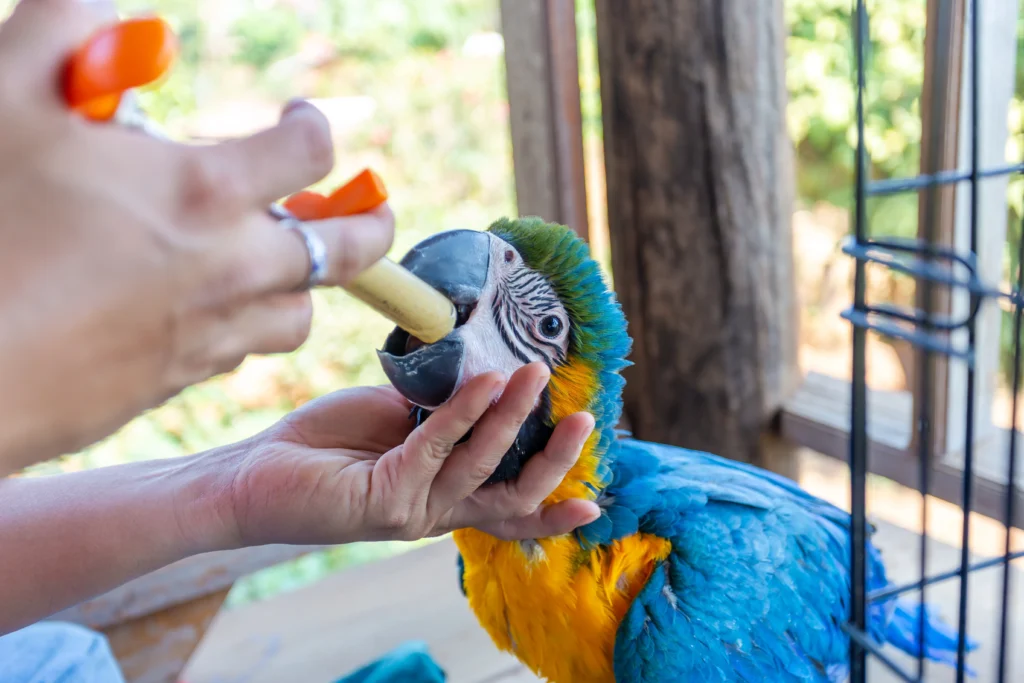
Nutrition forms the cornerstone of effective macaw health care. These large, active birds have specific dietary requirements that, when properly met, can prevent numerous health complications and contribute to vibrant feathers, strong immune systems, and overall vitality.
Creating a Balanced Macaw Diet and Nutrition Plan
The best food for macaws combines variety, nutritional completeness, and psychological stimulation. An ideal macaw diet and nutrition regimen typically includes:
- High-Quality Pellets (50-60%): Formulated pellets should constitute the foundation of your macaw’s diet. Look for brands specifically formulated for large parrots without artificial colors, preservatives, or excessive sugar. These pellets provide consistent nutrition and help prevent the selective eating that can occur with seed-only diets.
- Fresh Fruits (15-20%): Apples, bananas, berries, mangoes, and melons provide vital vitamins and hydration. However, fruits should be limited due to their sugar content. Remove seeds and pits from fruits like apples and cherries, as these can contain toxic compounds.
- Vegetables (20-25%): Dark leafy greens like kale, spinach (in moderation), and collard greens, along with colorful vegetables such as carrots, bell peppers, and squash, provide essential vitamins, minerals, and antioxidants crucial for macaw health care.
- Nuts and Seeds (5-10%): While nutritious, these should be offered sparingly due to their high fat content. Walnuts, almonds, and Brazil nuts provide healthy fats, but excessive consumption can lead to obesity—a common issue in captive macaws.
- Protein Sources: Occasional lean, cooked proteins like chicken, eggs, or legumes can supplement your macaw’s diet.
“Proper macaw health care starts in the food bowl,” explains Dr. Maria Rodriguez, avian veterinarian at the American Bird Conservation Center. “Many common macaw diseases we treat stem directly from nutritional deficiencies or imbalances.”
Avoiding Nutritional Pitfalls in Macaw Health Care
Even well-meaning owners can make dietary mistakes that compromise their bird’s health. As part of comprehensive macaw health care, avoid:
- All-Seed Diets: Seeds alone lack essential nutrients and are high in fat. Many macaws become “seed addicts,” refusing healthier options if raised on seeds exclusively.
- Toxic Foods: Avocado, chocolate, caffeine, alcohol, and foods high in salt or fat can prove fatal to macaws.
- Excess Treats: Commercial “bird treats” often contain excessive sugar and minimal nutrition, contributing to obesity and other health problems.
Proper hydration is another crucial component of macaw health care. Ensure your bird always has access to clean, fresh water, changing it at least once daily. Some macaws enjoy bathing in their water dishes, necessitating even more frequent changes.
Implementing these nutritional practices constitutes one of the most fundamental macaw health tips: feed your bird as though their life depends on it—because it does.
2. Preventative Health Measures: Regular Monitoring and Vet Care
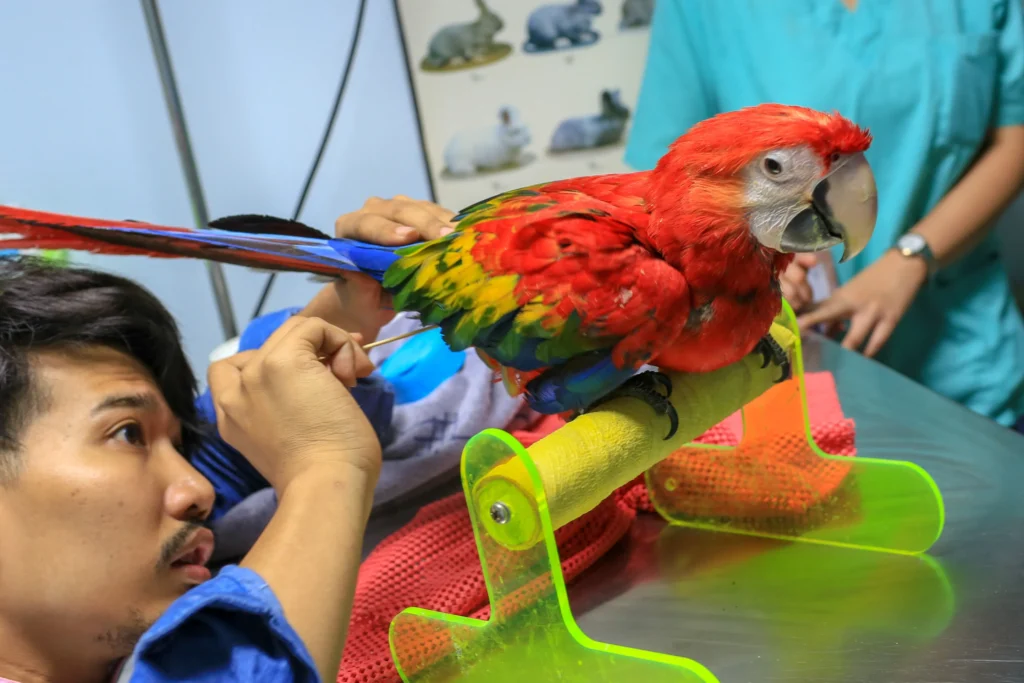
Preventative care forms the second critical pillar of effective macaw health care. Because these intelligent birds instinctively hide symptoms of illness (a survival mechanism in the wild), regular health monitoring and professional veterinary care are essential for early detection of problems.
Establishing a Relationship with an Avian Veterinarian
Finding a qualified avian veterinarian should be one of your first priorities when bringing a macaw home. General veterinarians often lack specialized training in avian medicine, potentially missing subtle signs of illness that avian specialists would identify.
Regular macaw vet checkups should occur at least annually for healthy adult birds and semi-annually for young or senior macaws. These visits typically include:
- Physical examination
- Weight monitoring
- Beak and nail assessment
- Blood tests to screen for common macaw diseases
- Fecal examination for parasites
“Prevention is infinitely preferable to treatment when it comes to macaw health care,” notes Dr. James Wilson, director of the Exotic Bird Health Institute. “Many serious conditions that could become life-threatening can be addressed simply and effectively when caught early.”
Recognizing Macaw Illness Symptoms
As a responsible macaw owner, familiarizing yourself with common macaw illness symptoms is crucial. Early warning signs that warrant immediate veterinary attention include:
- Changes in droppings (consistency, color, volume)
- Decreased appetite or water consumption
- Lethargy or unusual inactivity
- Fluffed feathers for extended periods
- Tail bobbing when breathing
- Nasal or ocular discharge
- Balance issues or weakness
- Unusual vocalizations
- Behavior changes
- Abnormal breathing sounds
Implementing a daily health check routine as part of your macaw health care regimen allows you to notice subtle changes quickly. Take a few minutes each morning to observe your bird’s behavior, droppings, food consumption, and general demeanor.
Addressing Common Macaw Diseases Through Prevention
Many common macaw diseases can be prevented through proper care and regular monitoring:
- Psittacine Beak and Feather Disease (PBFD): This viral disease affects a macaw’s immune system and causes feather loss and beak abnormalities. While there’s no cure, early detection through regular testing can help manage the condition.
- Psittacosis (Parrot Fever): This bacterial infection can spread between birds and humans. Regular testing and maintaining clean living conditions help prevent outbreaks.
- Aspergillosis: This fungal respiratory infection often stems from poor ventilation or dirty living conditions. Proper cage hygiene and air quality are essential preventative measures.
- Proventricular Dilatation Disease (PDD): This devastating viral condition affects the digestive system and nervous system. Regular health screenings help detect it early.
- Nutritional Deficiencies: Regular bloodwork can identify deficiencies before physical symptoms appear, allowing dietary adjustments before health deteriorates.
Creating a baseline health profile when your macaw is healthy gives your veterinarian valuable comparative data when problems arise. This proactive approach to macaw health care can add years to your bird’s life.
3. Beak, Feather, and Grooming Care: Maintaining Physical Health

The physical appearance of your macaw often reflects their internal health. Proper macaw grooming guide practices, attention to feather condition, and beak health monitoring constitute the third essential aspect of macaw health care.
Understanding Macaw Beak Problems
A macaw’s beak is constantly growing and requires regular maintenance to remain healthy. Common macaw beak problems include:
- Overgrowth: When beaks don’t wear down naturally through normal use, they can become overgrown, affecting eating and potentially causing pain.
- Scissor Beak: This condition occurs when the upper and lower mandibles don’t align properly, requiring veterinary intervention.
- Bacterial or Fungal Infections: Discoloration, texture changes, or flaking can indicate infections requiring treatment.
Proper macaw health care includes providing appropriate beak-maintenance toys such as natural wood branches, cuttlebone, and mineral blocks. However, these supplements don’t replace professional beak trimming when necessary. Only qualified avian veterinarians should perform beak trims, as improper techniques can cause pain, bleeding, or permanent damage.
Addressing Macaw Feather Loss
Healthy feathers are vital indicators of good macaw health care practices. Macaw feather loss can result from numerous causes:
- Normal Molting: Macaws naturally replace feathers periodically, but excessive or patchy molt warrants investigation.
- Feather Destructive Behavior: Self-mutilation through plucking or chewing feathers often indicates psychological distress, nutritional deficiencies, or underlying health issues.
- Parasites: External parasites like mites can cause intense irritation leading to feather damage.
- Bacterial or Fungal Infections: Skin infections can cause feather loss and discomfort.
- Hormonal Imbalances: Seasonal or abnormal hormonal fluctuations can trigger feather problems.
“Feather condition is one of our most valuable diagnostic tools in macaw health care,” explains avian behaviorist Dr. Sarah Thompson. “The feathers tell stories about nutrition, psychological well-being, and physical health that attentive owners should learn to read.”
Implementing a Macaw Grooming Guide
Regular grooming is an essential component of macaw health care. A basic macaw grooming guide includes:
- Bathing: Most macaws enjoy bathing, which helps maintain feather and skin health. Offer a shallow bath, gentle mist spray, or even shower opportunities several times weekly.
- Nail Maintenance: Overgrown nails can catch on cage furnishings and cause injuries. Provide natural perches of varying diameters and textures to promote natural wear, supplemented by professional trimming when necessary.
- Wing Trims: Discuss appropriate wing trimming with your avian veterinarian. Proper trims allow controlled gliding without completely grounding your bird.
- Environmental Humidity: Maintaining appropriate humidity levels (40-60%) supports healthy skin and feathers. In dry climates, consider room humidifiers or regular misting.
Establishing a regular grooming routine not only supports physical health but also provides valuable bonding time between you and your macaw, strengthening your relationship and making future handling for health examinations less stressful.
4. Psychological Well-being: The Overlooked Aspect of Macaw Health Care
The fourth critical component of comprehensive macaw health care addresses an area many owners underestimate: psychological health. Macaws are highly intelligent, social creatures that can develop serious behavioral and physical problems when their mental and emotional needs aren’t met.
Understanding Macaw Mental Health Needs
In the wild, macaws live in flocks, form strong pair bonds, and spend hours daily foraging, flying, and engaging in social interactions. Captive macaws retain these psychological needs, which must be addressed through:
- Social Interaction: Daily quality time with human companions or compatible bird companions is essential. Most macaws require at least 3-4 hours of interaction daily.
- Environmental Enrichment: Rotating toys, puzzles, foraging opportunities, and novel experiences prevent boredom and associated destructive behaviors.
- Physical Exercise: Flight (in safely bird-proofed areas) or wing-flapping opportunities, climbing structures, and play areas allow necessary physical activity that supports both physical and mental health.
- Routine and Security: Predictable daily schedules and safe, secure environments help macaws feel comfortable and reduce stress-related behaviors.
“Macaw mental health directly impacts physical health,” notes avian psychiatrist Dr. Michael Chen. “Stressed, bored, or anxious birds often develop self-destructive behaviors, compromised immune function, and susceptibility to illness. Comprehensive macaw health care must address psychological needs.”
Recognizing and Addressing Behavioral Issues
Many behavior problems in macaws stem from unmet psychological needs. Common issues include:
- Excessive Screaming: While vocalization is natural, persistent screaming often indicates attention-seeking, boredom, or distress.
- Aggression: Biting, lunging, or territorial behavior may develop from fear, hormonal changes, or inappropriate handling.
- Feather Destructive Behaviors: Plucking, chewing, or over-preening feathers often has psychological components.
- Stereotypic Behaviors: Repetitive movements like pacing, head-swinging, or excessive head-bobbing may indicate psychological distress.
Addressing these issues requires identifying root causes rather than merely treating symptoms. Work with an avian behaviorist if serious problems develop, as proper behavior modification techniques can dramatically improve quality of life for both bird and owner.
Creating an Enriched Environment
Environmental enrichment is a cornerstone of proper macaw health care. Consider:
- Foraging Opportunities: Hide food in puzzle toys, wrapped paper packages, or specially designed foraging toys to simulate natural foraging behavior.
- Varied Perches: Provide branches of different diameters, textures, and materials to exercise feet and prevent pressure sores.
- Rotation Schedule: Maintain multiple sets of toys, rotating them weekly to prevent boredom.
- Learning Opportunities: Many macaws enjoy learning tricks, words, or participating in training sessions that provide mental stimulation.
- Safe Exploration: Supervised out-of-cage time in bird-proofed areas allows exercise and environmental engagement.
Implementation of these psychological wellness strategies should be considered as essential to macaw health care as diet or veterinary visits. A mentally stimulated, emotionally secure macaw typically exhibits fewer health problems and enjoys a higher quality of life.
5. Emergency Preparedness: Critical Macaw First Aid Knowledge
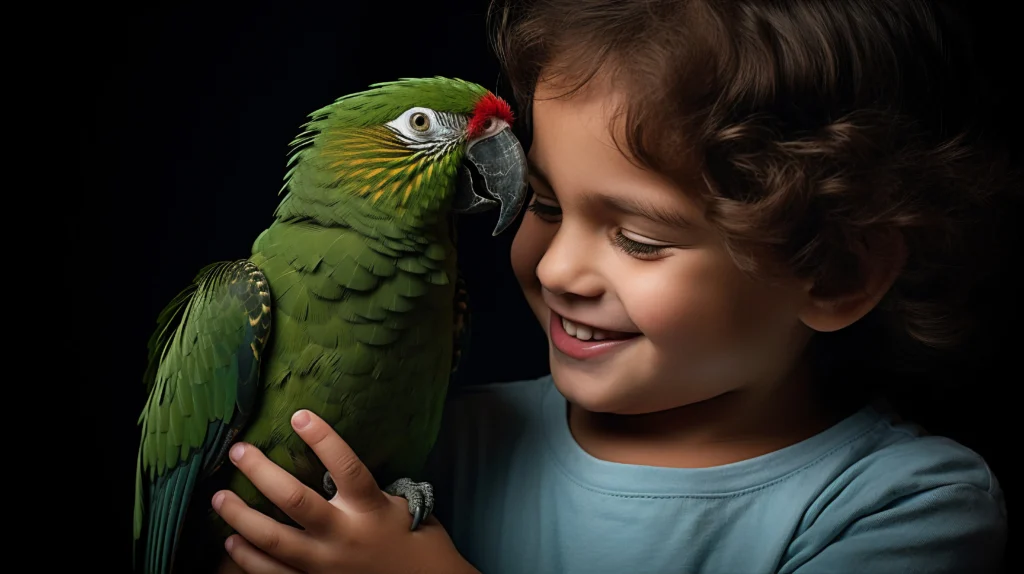
The fifth vital component of macaw health care involves preparation for emergencies. Even with excellent preventative care, emergencies can arise, and knowing how to respond in the critical first minutes can save your bird’s life.
Creating a Macaw First Aid Kit
Every macaw owner should maintain a well-stocked first aid kit specifically for their bird. Essential components include:
- Styptic powder (to stop bleeding from broken blood feathers or minor cuts)
- Clean towels for bird restraint
- Digital thermometer (normal avian temperature ranges from 102-104°F)
- Tweezers (for splinter or foreign object removal)
- Small flashlight
- Sterile saline solution
- Cotton swabs and gauze pads
- Avian-safe disinfectant
- Small heating pad or hot water bottle
- Contact information for your avian veterinarian, emergency vet services, and avian poison control
Keep this kit readily accessible, checking periodically to replace expired items. Familiarize yourself with the contents before emergencies occur.
Recognizing Life-Threatening Emergencies
As part of responsible macaw health care, learn to identify situations requiring immediate veterinary intervention:
- Bleeding: Especially from broken blood feathers, which can cause rapid blood loss
- Respiratory Distress: Open-mouthed breathing, tail bobbing, or extended neck posture
- Seizures or Loss of Consciousness: Immediate medical emergency
- Prolapse: Tissue protruding from the vent requires immediate attention
- Suspected Poisoning: Exposure to toxic substances or plants
- Severe Trauma: Falls, crushing injuries, or attacks by other animals
- Egg Binding: Female unable to pass an egg
- Sudden Weakness: Inability to perch or maintain balance
“The most important macaw first aid skill is recognizing when you need professional help,” emphasizes emergency avian veterinarian Dr. Lisa Johnson. “Transport to a qualified veterinarian should never be delayed for non-essential first aid measures.”
Transport Guidelines for Emergencies
Proper transport during emergencies is an often-overlooked aspect of macaw health care. Maintain a small, secure carrier specifically for emergency use, lined with a towel or non-slip material. Keep the carrier easily accessible, not stored in difficult-to-reach locations.
During transport:
- Maintain appropriate temperature (avoid exposing your bird to drafts or extreme temperatures)
- Minimize stress with a partially covered carrier
- Avoid unnecessary noise or jarring movements
- If possible, have someone else drive while you monitor your bird
Having established relationships with avian veterinarians before emergencies occur—including knowing their emergency protocols, hours, and contact information—is an essential part of responsible macaw health care.
Special Considerations for Different Life Stages
Comprehensive macaw health care varies throughout your bird’s life. Understanding these differences helps you provide appropriate care at each stage:
Young Macaws (Under 2 Years)
Young macaws require:
- More frequent veterinary checkups to monitor development
- Proper nutrition to support growth
- Extra patience during training and socialization
- Special attention to prevent problematic behaviors from developing
Adult Macaws (2-30 Years)
Mature macaws benefit from:
- Annual health screenings to detect emerging issues
- Consistent behavioral boundaries
- Regular weight monitoring to prevent obesity
- Appropriate hormonal management during breeding seasons
Senior Macaws (30+ Years)
Aging macaws often need:
- Semi-annual veterinary examinations
- Modified diets to address changing nutritional needs
- Cage accommodations for decreased mobility
- Increased monitoring for age-related conditions like arthritis or organ dysfunction
“Macaw lifespan care requires adapting your approach as your bird ages,” notes senior avian specialist Dr. Robert Patel. “The macaw health care that worked wonderfully at age 10 may need significant modification by age 40.”
The Role of Environment in Macaw Health Care
Your macaw’s living environment substantially impacts their overall health. Optimal housing conditions include:
Cage Considerations
- Size: The minimum cage for a large macaw should allow full wing extension in all directions, with dimensions no smaller than 36″ W × 24″ D × 48″ H for smaller species and substantially larger for larger species like Hyacinth Macaws.
- Bar Spacing and Strength: Bars should be horizontally oriented for climbing, appropriately spaced (¾” to 1″ for smaller macaws, 1″ to 1.5″ for larger species), and constructed from sturdy, bird-safe materials like stainless steel.
- Location: Place cages away from drafts, direct sunlight, kitchens (cooking fumes can be toxic), and high-traffic areas that prevent rest.
Air Quality
Poor air quality contributes to respiratory issues in macaws. Avoid:
- Cigarette smoke
- Aerosol products
- Scented candles or plug-ins
- Non-stick cookware fumes (which release potentially fatal toxins when overheated)
- Strong cleaning products
Temperature and Humidity
Maintain ambient temperatures between 65-85°F (18-29°C) and humidity between 40-60% for optimal macaw health care. Sudden temperature changes can stress your bird’s system and potentially trigger illness.
Light Exposure
Natural, unfiltered sunlight (not through glass or plastic) provides essential vitamin D for macaws. If direct outdoor sunlight isn’t possible, full-spectrum lighting designed specifically for birds can help meet this need.
Parasite Prevention and Treatment
Parasite control constitutes another important aspect of macaw health care. Common parasites affecting macaws include:
External Parasites
- Mites: These microscopic parasites cause intense itching, feather damage, and skin irritation.
- Lice: Bird lice cause irritation and can be identified as small moving specks among feathers.
- Ticks: Less common in indoor birds but possible in macaws with outdoor exposure.
Internal Parasites
- Giardia: These protozoan parasites cause digestive upset and discomfort.
- Roundworms, Tapeworms, and Other Intestinal Parasites: These can cause weight loss, digestive issues, and nutrient malabsorption.
Regular fecal examinations as part of routine macaw vet checkups help identify internal parasites before they cause significant health problems. Treatment typically involves targeted medications prescribed by your avian veterinarian.
“Never attempt macaw parasite treatment with over-the-counter products designed for other animals,” warns parasitologist Dr. Elena Martinez. “Products safe for dogs or cats may be toxic to birds, and proper dosing requires professional guidance.”
Conclusion: Integrating the Five Pillars of Macaw Health Care
Successful macaw health care requires integrating all five critical areas we’ve discussed: nutrition, preventative care, physical maintenance, psychological well-being, and emergency preparedness. These interconnected aspects of care support one another, creating a comprehensive approach to your macaw’s wellness.
Remember that macaw health care isn’t a set-it-and-forget-it proposition—it requires ongoing education, adaptation, and attention. As research advances our understanding of avian health, responsible owners continue learning and adjusting their care practices accordingly.
By implementing the macaw health tips outlined in this guide, you’re taking essential steps toward ensuring your colorful companion enjoys not just a long life, but a high-quality one filled with physical wellness and psychological fulfillment. Your investment in proper macaw health care today will reward you with years of companionship from one of nature’s most magnificent and engaging creatures.
Additional Resources for Macaw Health Care
For further information on macaw health care, consult these reputable sources:
- Association of Avian Veterinarians – Find qualified avian veterinarians and access educational resources
- Avian Welfare Coalition – Information on proper care and welfare of companion birds
- World Parrot Trust – Conservation organization with excellent care resources
- Lafeber Vet – Veterinary-focused information on bird health and nutrition
- PetsMemes.com Bird Care Guides – Additional articles on proper bird care
- PetsMemes.com Macaw Diet Guide – Detailed information about macaw nutrition
- PetsMemes.com Common Avian Diseases – Comprehensive guide to bird health issues
Remember that while online resources provide valuable information, they never replace the personalized guidance of a qualified avian veterinarian familiar with your individual bird’s health history and needs. Regular macaw vet checkups remain the cornerstone of responsible macaw health care throughout your bird’s life.
Disclaimer: This article is intended for informational purposes only and does not replace professional veterinary advice. Always consult with a qualified avian veterinarian regarding your macaw’s specific health needs.


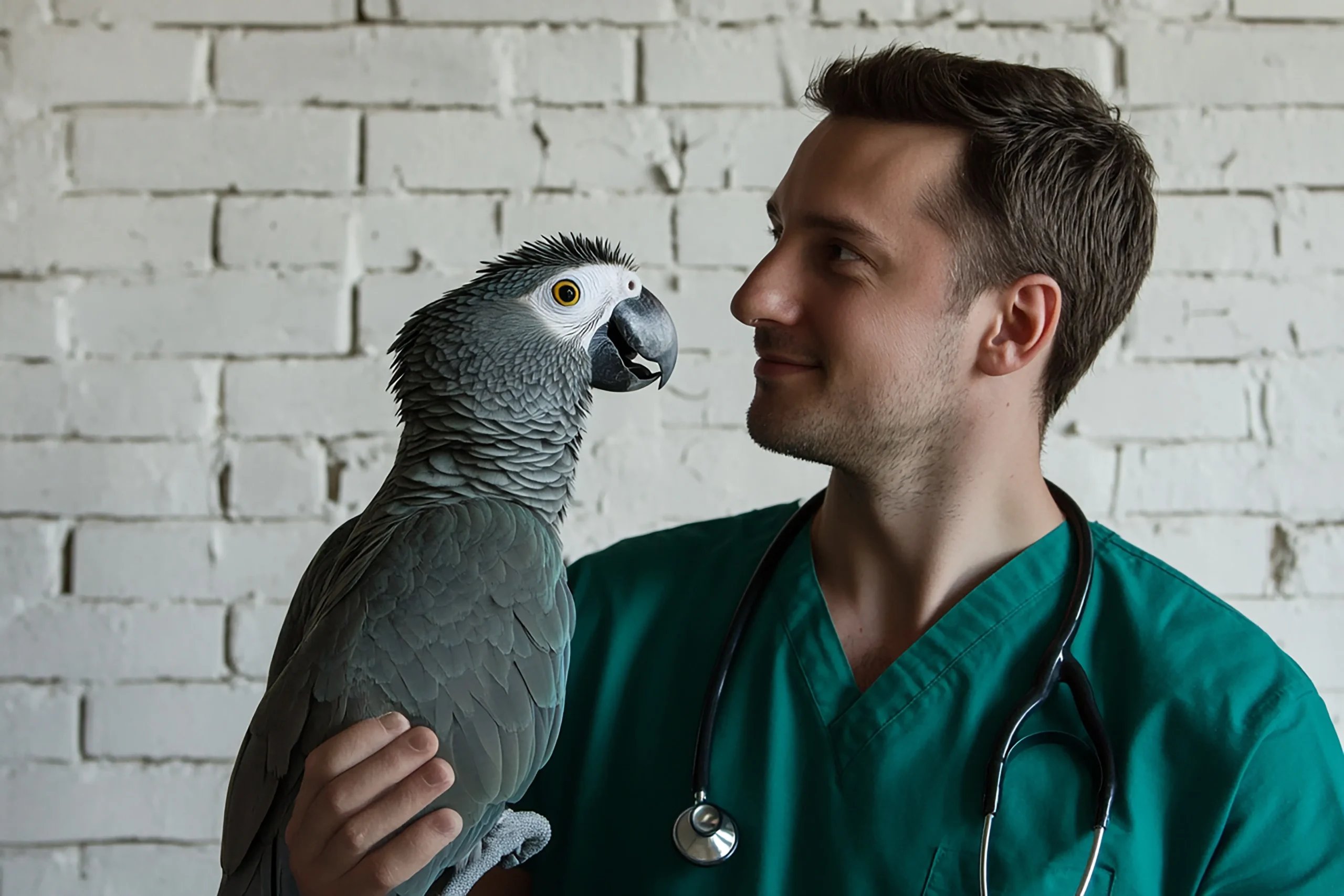
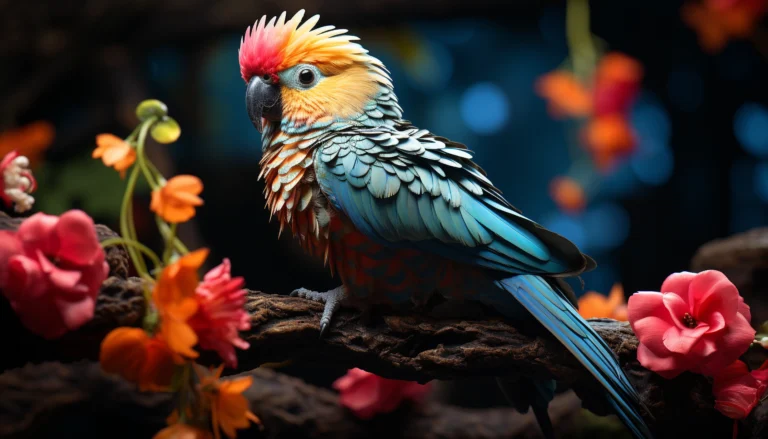

Leave a Comment